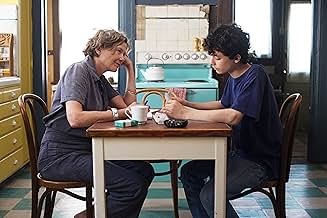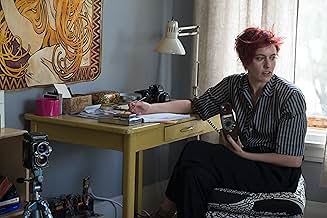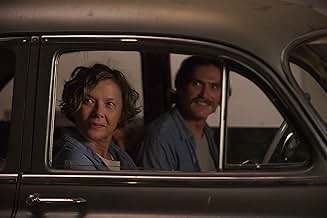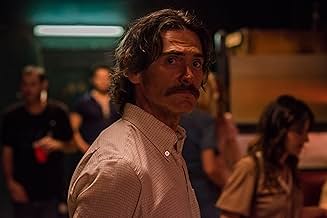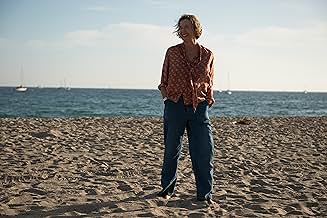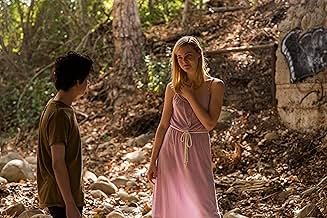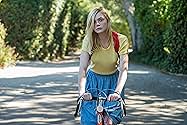20th Century Women
- 2016
- Tous publics
- 1h 59min
NOTE IMDb
7,3/10
51 k
MA NOTE
L'histoire d'un adolescent, de sa mère et de deux autres femmes qui aident à l'élever dans une atmosphère d'amour et de liberté en Californie du Sud en 1979.L'histoire d'un adolescent, de sa mère et de deux autres femmes qui aident à l'élever dans une atmosphère d'amour et de liberté en Californie du Sud en 1979.L'histoire d'un adolescent, de sa mère et de deux autres femmes qui aident à l'élever dans une atmosphère d'amour et de liberté en Californie du Sud en 1979.
- Réalisation
- Scénario
- Casting principal
- Nommé pour 1 Oscar
- 15 victoires et 82 nominations au total
Vitaly Andrew LeBeau
- Young Jamie Fields
- (as Vitaly A. Lebeau)
Avis à la une
9Lele
I understand the rage of many other US reviewers because this movie is so far from usual Hollywood clichés that it does not even look like an US movie! It seems an European movie. Bergman, Fellini and stuff...
It is NOT boring. It has its pace and it is exacly what it has to be.
I identified myself at different levels. I was born in 1958, just like the main actress (great performance). And like Dorothea I had a daugther when I was in my 40s (she now is 15, like Jamie, Dorothea's son) and I don't know how to talk to her, I don't like much of the music she likes and so on.
I was a teenager in the 70s, so I identified with Jamie, great character: I wish I had one thousandth of his self-consciousness when I was his age!
This movie was oxygen for suffocating US major's movies, after sequels and remakes and CGI shows finally something to think about.
This movie was oxygen for suffocating US major's movies, after sequels and remakes and CGI shows finally something to think about.
The status of "too personal" could be its basic virtue. and its sin. because it represents a chronicle. about "80 decade, about family life in large sense, about sexual education and motherhood. and, sure, about freedom. in same measure, it is a film with precise target. remembering independent films, near to every day details too much, it is the film who could be an experience, usuful in profound sense, or just waste of time. but, out of that too easy definitions, it is an admirable work. for script, performances - the kind of film in which each actor seems be the only wise choice for his character - but, first, for Annette Bening who does a magnificent job as middle age mother, in war against her past, insecure about future, without courage to become herself, appentice of her son, discovering the essence of life next her friends. a great film. really !
Elle Fanning uggh yes. Okay, now that that's out of the way lets get to this film. This seemed like an unconventional coming of age film and that is basically what this was. Its not a mindblowingly amazing film and has some flaws. However, what I thought was a flaw may have worked for another viewer. What I can say though, is that the film left a better impression on me than I thought it would.
The performances of this film are great, particularly that of Greta Gerwig and Annette Bening. Gerwig is such a real character who is pained but absolutely does what she wants to do in life. She has a hard time finding love but her very open nature makes her identifiable. Bening is tremendous in the best role I've seen from her. She's an easygoing mother who is worried about her son and how he deals with life. Remarkably cool but nuanced. Also, Elle Fanning good lord I love her. Okay, I had to get that out of my system again. All of the characters have substantial depth and you do not leave the film feeling like a character's story was underdeveloped. The main core of characters are all in close proximity with each other and through their interactions you get to see their turmoils, struggles, and comfortable nature with each other.
The stories of the characters of the film are at times told by themselves and they seem to be telling the story from a future time, where they have experienced the entirety of their lives. I liked this technique of expansive storytelling. However, there are other things in the film that don't work as well. The slideshow of images of the culture of the 70's seemed gimmicky and didn't exactly add to the film's narrative. It seemed like an attempt to be able to grab viewers but wasn't exactly necessary. There are also times where the scenes have a "psychedelic effect" where the car races off in the highway in a dreamy haze, full with the colors of the rainbow emanating from the car. Again, I thought this was quite gimmicky and trying to harden the fact that this film was supposed to be set in the 70s.
I think one of the things that worked with the film was its humor. There is a lot of it, and while its not always subtle and funny a good amount of it works to make you chuckle or really laugh. Its not something I was expecting but is definitely something that made the film more memorable. There are some scenes that really, really work and help you really want to live in the frame of the characters. The film really focuses on women at the time and a teenage boy trying to navigate in a sea of women in his life. While its not always accurate about men, I think its doing a pleasant job of trying to connect the two while showing some of the plights experienced when men and women try to understand each other. What you get here is a well acted, humorous films that works to entertain.
7/10
The performances of this film are great, particularly that of Greta Gerwig and Annette Bening. Gerwig is such a real character who is pained but absolutely does what she wants to do in life. She has a hard time finding love but her very open nature makes her identifiable. Bening is tremendous in the best role I've seen from her. She's an easygoing mother who is worried about her son and how he deals with life. Remarkably cool but nuanced. Also, Elle Fanning good lord I love her. Okay, I had to get that out of my system again. All of the characters have substantial depth and you do not leave the film feeling like a character's story was underdeveloped. The main core of characters are all in close proximity with each other and through their interactions you get to see their turmoils, struggles, and comfortable nature with each other.
The stories of the characters of the film are at times told by themselves and they seem to be telling the story from a future time, where they have experienced the entirety of their lives. I liked this technique of expansive storytelling. However, there are other things in the film that don't work as well. The slideshow of images of the culture of the 70's seemed gimmicky and didn't exactly add to the film's narrative. It seemed like an attempt to be able to grab viewers but wasn't exactly necessary. There are also times where the scenes have a "psychedelic effect" where the car races off in the highway in a dreamy haze, full with the colors of the rainbow emanating from the car. Again, I thought this was quite gimmicky and trying to harden the fact that this film was supposed to be set in the 70s.
I think one of the things that worked with the film was its humor. There is a lot of it, and while its not always subtle and funny a good amount of it works to make you chuckle or really laugh. Its not something I was expecting but is definitely something that made the film more memorable. There are some scenes that really, really work and help you really want to live in the frame of the characters. The film really focuses on women at the time and a teenage boy trying to navigate in a sea of women in his life. While its not always accurate about men, I think its doing a pleasant job of trying to connect the two while showing some of the plights experienced when men and women try to understand each other. What you get here is a well acted, humorous films that works to entertain.
7/10
Greetings again from the darkness. Writer/director Mike Mills has found a niche, and a form of therapy, by exploring and exposing his life in a most public manner
on the silver screen. Beginners (2010) brought us the story of his father's (an Oscar winner for Christopher Plummer) late life pronouncement of homosexuality. This time, Mr. Mills turns his lens and his pen towards his mother, and he seems to understand her much better in retrospect than in the summer of 1979 when the film is set.
This can be viewed as the story of three women, masked as a coming-of-age story for a teenage boy. Annette Bening stars as Dorothea, a chain-smoking single mother in her mid-50's who seems to have surrendered to her own sadness and loneliness, while simultaneously trying to make sense of a changing world. One of her tenants is Abbie (Greta Gerwig), a photographer and NYC punk scene drop-out, who is now battling cervical cancer. The third female is the seemingly always present Julie (Elle Fanning), a sexually promiscuous and borderline depressive 18 year old who values the platonic friendship she has with Dorothea's 15 year old son Jamie (Lucas Jade Zuman).
Factor in another tenant in the form of laid-back handyman and former hippie William (Billy Crudup), and we have a makeshift family in a communal setting that seems almost normal for 1979 Santa Barbara. Dorothea enlists the other two women to show Jamie their lives – the intent being to influence his growth in ways an older mother can't. Of course, Jamie is at the age where exploring life isn't necessarily best served by tagging along on a trip to the gynecologist with Abbie or having no-touch sleepovers with Julie.
Ms. Bening finds her groove as the story progresses and we feel her struggling to connect to each of the characters. When William plays a Black Flag song, her reaction is priceless: "They know they're not good, right?" She doesn't mean it as a put down, but rather her attempt to understand why her son is drawn to this. An even more emotionally naked moment occurs when Jamie is reading a passage from "The Feminine Mystique" to his mother. It's a passage that captures what he thinks of her, as well as what she thinks of herself a mostly invisible woman finding it difficult to be a parent while also maintaining a self.
Mills is not one to be nostalgic or glorify the past. His brilliant writing includes lines like "Wondering if you are happy is a great short cut to being depressed." The movie can be slow moving at times, but it's the best I've seen in awhile at expressing what makes us tick. The film is what Running with Scissors should have been. Real people are sometimes interesting, sometimes boring, and sometimes annoying. Each of the characters here are all of the above (just like you and me).
This can be viewed as the story of three women, masked as a coming-of-age story for a teenage boy. Annette Bening stars as Dorothea, a chain-smoking single mother in her mid-50's who seems to have surrendered to her own sadness and loneliness, while simultaneously trying to make sense of a changing world. One of her tenants is Abbie (Greta Gerwig), a photographer and NYC punk scene drop-out, who is now battling cervical cancer. The third female is the seemingly always present Julie (Elle Fanning), a sexually promiscuous and borderline depressive 18 year old who values the platonic friendship she has with Dorothea's 15 year old son Jamie (Lucas Jade Zuman).
Factor in another tenant in the form of laid-back handyman and former hippie William (Billy Crudup), and we have a makeshift family in a communal setting that seems almost normal for 1979 Santa Barbara. Dorothea enlists the other two women to show Jamie their lives – the intent being to influence his growth in ways an older mother can't. Of course, Jamie is at the age where exploring life isn't necessarily best served by tagging along on a trip to the gynecologist with Abbie or having no-touch sleepovers with Julie.
Ms. Bening finds her groove as the story progresses and we feel her struggling to connect to each of the characters. When William plays a Black Flag song, her reaction is priceless: "They know they're not good, right?" She doesn't mean it as a put down, but rather her attempt to understand why her son is drawn to this. An even more emotionally naked moment occurs when Jamie is reading a passage from "The Feminine Mystique" to his mother. It's a passage that captures what he thinks of her, as well as what she thinks of herself a mostly invisible woman finding it difficult to be a parent while also maintaining a self.
Mills is not one to be nostalgic or glorify the past. His brilliant writing includes lines like "Wondering if you are happy is a great short cut to being depressed." The movie can be slow moving at times, but it's the best I've seen in awhile at expressing what makes us tick. The film is what Running with Scissors should have been. Real people are sometimes interesting, sometimes boring, and sometimes annoying. Each of the characters here are all of the above (just like you and me).
The scene feels remarkably familiar – Dorothea (Bening), the matron and saint of a Santa Barbara household circa 1979 leans in on her son Jamie (Zumann) listening to "Fairytale in the Supermarket" by The Raincoats. "They know they sound terrible right?" she says. Abbie (Gerwig), Dorothea's avant-garde lodger interjects; "yeah, but it's like they don't care. They got all this feeling but don't have the tools they need to express it
it all comes out as passion." Dorothea fixates on Abbie's intonation, like listening to language she's only now grasping. She gets it...but then she doesn't.
Much like Abbie's defense of The Raincoats, Dorothea believes she has all the passion to be a proper mother, but she lacks the right tools to support a son who is growing older with each passing moment. She decides to enlist the help of two young women; Julie, Jamie's best friend and crush and Abbie a free spirit who was recently treated for cervical cancer. The only other man in the picture is William (Crudup) a well-meaning former hippie with a gift for mechanics and a passion for pottery. Between them all, the stalwart Dorothea hopes to quietly guide her son through his formative years which pit her depression era approach, to Jamie's recession era resentments. "Don't you need a man to raise another man?" asks Julie. "No I don't think you do." 20th Century Women starts with competing voice-overs and uses a collage approach to convey the surfaces of each character's inner life. The collages are stuffed to the brim with stills of 1930's gloom and 1960's turbulence all set to audio of proto-punk, Jimmy Carter's Malaise Speech and "As Life Goes By" from Casablanca (1942). It's an awkward mix; one that creates an echo chamber of sorts.
That subtle discordance of people talking at and not to each other, runs through the first half of the film. Jamie's coming-of-age story, a volatile mix of stubborn familial resentment and unrequited love clobbers together with Dorothea's own midlife crisis. "I had Jamie when I was 40." Dorothea says; a fact that can help explain Dorothea's free-range parenting approach, but also helps explain why Jamie's sharp insights cut so deep. For a while there it always seems like its Jamie versus Dorothea, pulled apart by an ever widening generational gap.
Then, like responding to the blessing of a wartime parlay, the factions in this film begin to center and calm. It is during this truce that the film begins to really take off, presenting its characters with vibrancy and humanity while flying through a more nuanced story arc. Almost independently both Jamie and Dorothea learn their goals are one in the same and the differences they have are little compared to their mutual respect for time which presents itself in rainbow tinged tracking shots and subtle fast-forwards.
And at the center of 20th Century Women lies the affable Annette Bening who suitably captures the zeitgeist of a generation no longer with us. While most might pigeonhole Dorothea as a madcap eccentric or worse a passive pushover, Bening wisely lets the character's inner strength shine through. Dorothea is unabashedly a one of a kind lady. She invites strangers to dinner, invites herself to punk clubs, leaves early, and then comes back days later alone. She verves uncomfortably with post-sexual revolution mores yet she quietly takes frank conversations about menstruation in stride. She does all this because she knows that with every encounter, every meeting, every stranger there's a chance for exchange.
Of course 20th Century Women is not without its problems. While Bening, Gerwig and Fanning all do wonders in their roles, Zumann fails to endear the young Jamie to the audience in any meaningful way. Part of it is due to the part as it is written. The film is loosely based on the life of director Mike Mills thus Jamie at times feels more like an avatar than a real teenager. Additionally it's ironic that despite constant paraphrasing of feminist literature, 20th Century Women would struggle to pass the Bechdel Test. Our three women characters orbit Jamie's life and analyze his actions and motives like he's the center of their universe.
Yet, while the film uses the wider Women's Liberation movement as window dressing, allowing the external conflicts of the film to melt away to reveal honest internal pain was a stroke of genius. Genius enough to maybe be interpreted as a meta-text on standard storytelling practices being a form of patriarchal oppression. That however is a discussion for another day. 20th Century Women is an artfully rendered film with plenty to say about the passage of time, the commonality between the generation gaps and the unifying love of mother and son.
Much like Abbie's defense of The Raincoats, Dorothea believes she has all the passion to be a proper mother, but she lacks the right tools to support a son who is growing older with each passing moment. She decides to enlist the help of two young women; Julie, Jamie's best friend and crush and Abbie a free spirit who was recently treated for cervical cancer. The only other man in the picture is William (Crudup) a well-meaning former hippie with a gift for mechanics and a passion for pottery. Between them all, the stalwart Dorothea hopes to quietly guide her son through his formative years which pit her depression era approach, to Jamie's recession era resentments. "Don't you need a man to raise another man?" asks Julie. "No I don't think you do." 20th Century Women starts with competing voice-overs and uses a collage approach to convey the surfaces of each character's inner life. The collages are stuffed to the brim with stills of 1930's gloom and 1960's turbulence all set to audio of proto-punk, Jimmy Carter's Malaise Speech and "As Life Goes By" from Casablanca (1942). It's an awkward mix; one that creates an echo chamber of sorts.
That subtle discordance of people talking at and not to each other, runs through the first half of the film. Jamie's coming-of-age story, a volatile mix of stubborn familial resentment and unrequited love clobbers together with Dorothea's own midlife crisis. "I had Jamie when I was 40." Dorothea says; a fact that can help explain Dorothea's free-range parenting approach, but also helps explain why Jamie's sharp insights cut so deep. For a while there it always seems like its Jamie versus Dorothea, pulled apart by an ever widening generational gap.
Then, like responding to the blessing of a wartime parlay, the factions in this film begin to center and calm. It is during this truce that the film begins to really take off, presenting its characters with vibrancy and humanity while flying through a more nuanced story arc. Almost independently both Jamie and Dorothea learn their goals are one in the same and the differences they have are little compared to their mutual respect for time which presents itself in rainbow tinged tracking shots and subtle fast-forwards.
And at the center of 20th Century Women lies the affable Annette Bening who suitably captures the zeitgeist of a generation no longer with us. While most might pigeonhole Dorothea as a madcap eccentric or worse a passive pushover, Bening wisely lets the character's inner strength shine through. Dorothea is unabashedly a one of a kind lady. She invites strangers to dinner, invites herself to punk clubs, leaves early, and then comes back days later alone. She verves uncomfortably with post-sexual revolution mores yet she quietly takes frank conversations about menstruation in stride. She does all this because she knows that with every encounter, every meeting, every stranger there's a chance for exchange.
Of course 20th Century Women is not without its problems. While Bening, Gerwig and Fanning all do wonders in their roles, Zumann fails to endear the young Jamie to the audience in any meaningful way. Part of it is due to the part as it is written. The film is loosely based on the life of director Mike Mills thus Jamie at times feels more like an avatar than a real teenager. Additionally it's ironic that despite constant paraphrasing of feminist literature, 20th Century Women would struggle to pass the Bechdel Test. Our three women characters orbit Jamie's life and analyze his actions and motives like he's the center of their universe.
Yet, while the film uses the wider Women's Liberation movement as window dressing, allowing the external conflicts of the film to melt away to reveal honest internal pain was a stroke of genius. Genius enough to maybe be interpreted as a meta-text on standard storytelling practices being a form of patriarchal oppression. That however is a discussion for another day. 20th Century Women is an artfully rendered film with plenty to say about the passage of time, the commonality between the generation gaps and the unifying love of mother and son.
Le saviez-vous
- AnecdotesDuring rehearsals, the cast was encouraged to bring in music they believed their characters listened to. Then, to encourage familiarity among the cast, there would be a dance party where the only rule was that everyone had to dance and it didn't matter what the song was.
- GaffesDorothea is variously depicted discussing her stock portfolio with her son Jamie, quoting NYSE share prices in decimals, doing this in 1979. However, the switch to decimal from fractional stock prices in the U.S. did not occur until the year 2000.
- ConnexionsFeatured in WatchMojo: Top 10 Movies of 2016 Already Getting Oscar Buzz (2016)
- Bandes originalesDon't Worry About the Government
Written by David Byrne
Performed by Talking Heads
Courtesy of Sire Records
By arrangement with Warner Music Group Film & TV Licensing
Meilleurs choix
Connectez-vous pour évaluer et suivre la liste de favoris afin de recevoir des recommandations personnalisées
- How long is 20th Century Women?Alimenté par Alexa
Détails
- Date de sortie
- Pays d’origine
- Sites officiels
- Langue
- Aussi connu sous le nom de
- Mujeres del siglo XX
- Lieux de tournage
- East Beach, Santa Barbara, Californie, États-Unis(Santa Barbara, CA)
- Sociétés de production
- Voir plus de crédits d'entreprise sur IMDbPro
Box-office
- Budget
- 7 000 000 $US (estimé)
- Montant brut aux États-Unis et au Canada
- 5 664 764 $US
- Week-end de sortie aux États-Unis et au Canada
- 111 200 $US
- 1 janv. 2017
- Montant brut mondial
- 7 214 806 $US
- Durée
- 1h 59min(119 min)
- Couleur
- Mixage
- Rapport de forme
- 2.00 : 1
Contribuer à cette page
Suggérer une modification ou ajouter du contenu manquant







